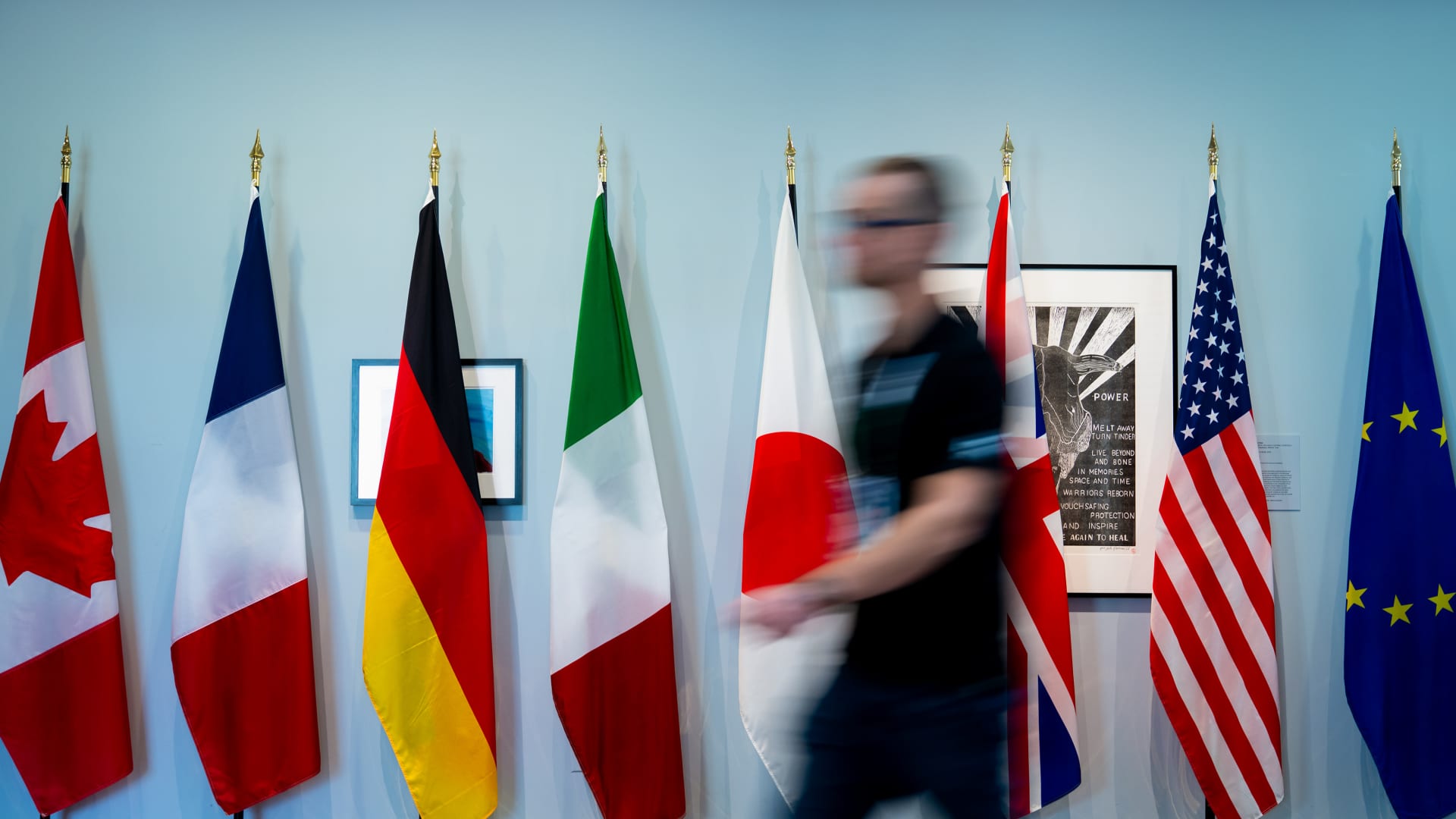G-7 leaders gather in Canada for summit overshadowed by Middle East crisis and Trump’s tariffs

The flags of Canada, France, Germany, Italy, Japan, the United Kingdom, the United States, and the European Union ahead of the Group of Seven (G-7) Leaders’ Summit in Banff, Alberta, Canada, on Saturday, June 14, 2025.
Bloomberg | Bloomberg | Getty Images
Leaders of some of the world’s biggest economic powers will arrive in the Canadian Rockies on Sunday for a Group of Seven (G-7) summit overshadowed by a widening war across the Middle East and U.S. President Donald Trump’s unresolved trade war with allies and rivals alike.
Israel’s strikes on Iran and Tehran’s retaliation, which appeared to catch many world leaders unawares, are the latest sign of a more volatile world as Trump seeks to withdraw the U.S. from its role as world policeman.
Speaking on a flight to Canada to attend the summit, British Prime Minister Keir Starmer said he had discussed efforts to de-escalate the situation with Trump and Israeli Prime Minister Benjamin Netanyahu, as well as other world leaders.
Britain is sending Royal Air Force jets and other military reinforcements to the Middle East.
“We do have longstanding concerns about the nuclear program Iran has. We do recognize Israel’s right to self-defense, but I’m absolutely clear that this needs to de-escalate. There is a huge risk of escalation for the region and more widely,” Starmer said, adding he expected “intense discussions” would continue at the summit.
Emmanuel Macron is making a highly symbolic stop in Greenland on his way to Canada, meeting the Arctic territory’s leader and Denmark’s prime minister aboard a Danish helicopter carrier.
Macron, who is one of the very few leaders to have known Trump during his first term, was the first European leader to visit the White House after Trump took office, emerging unscathed from the Oval Office encounter.
But despite the two leaders’ sporadic bromance, Macron’s approach to Trump has failed to bear major results, with France caught up in the president’s planned tariffs on the European Union.
Nor did it bring any U.S. security guarantees for Ukraine despite Macron’s efforts, together with Starmer, to build a coalition of nations that could deploy forces after any ceasefire with Russia, with the hope it would convince the Trump administration to provide backup.
Trump is scheduled to arrive late Sunday in Kananaskis, Alberta. Bilateral meetings between other leaders are possible Sunday, but the summit program does not get underway until Monday.
Peter Boehm, Canada’s sherpa of the 2018 G7 summit in Quebec and veteran of six G7 summits, expects the heads of state to pivot the discussion to devote more time to the war.
“Leaders can accommodate a discussion, perhaps even a statement,” Boehm said. “The foreign policy agenda has become much larger with this.”
Volodymyr Zelenskyy is due to attend the summit and is expected to meet with Trump, a reunion coming just months after their bruising Oval Office encounter, which laid bare the risks of having a meeting with the U.S. president.
Starmer met with Carney in Ottawa before the summit for talks focused on security and trade, in the first visit to Canada by a British prime minister for eight years.
German officials were keen to counter the suggestion that the summit would be a “six against one” event, noting that the G-7 countries have plenty of differences of emphasis among themselves on various issues.
“The only problem you cannot forecast is what the president of the United States will do depending on the mood, the need to be in the news,” said Chrétien.
[title_words_as_hashtags



